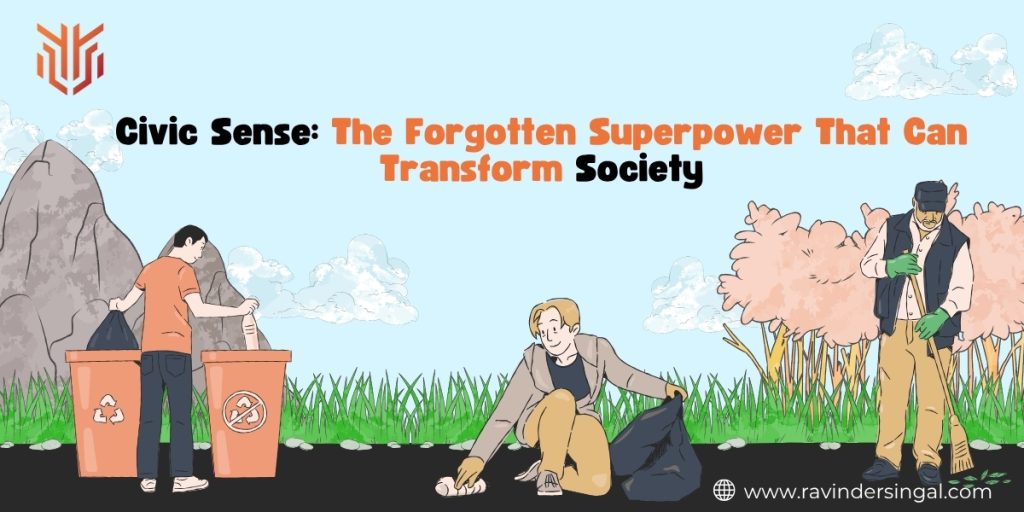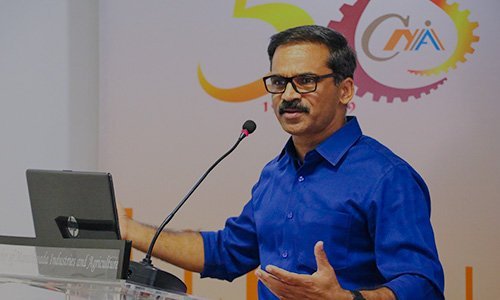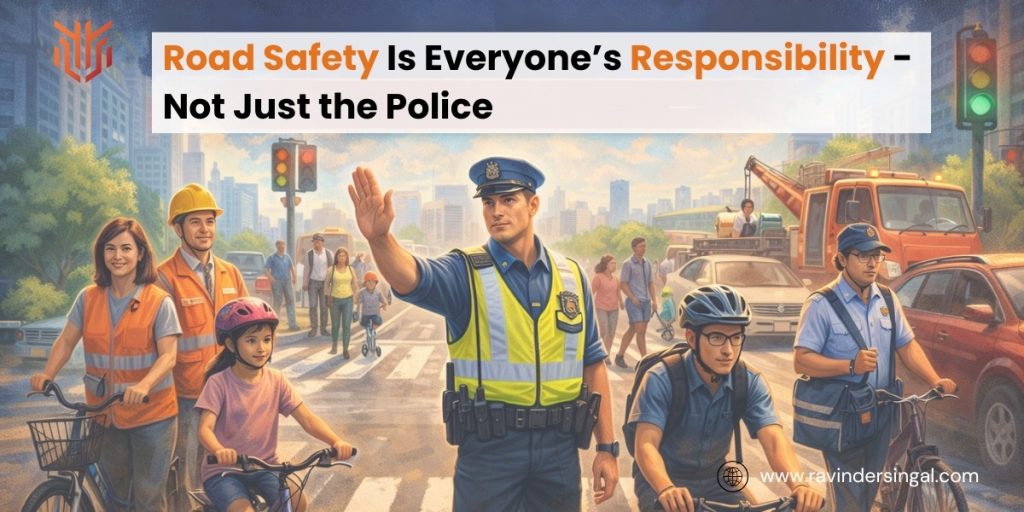Civic Sense: The Forgotten Superpower That Can Transform Society

“A nation is not built by monuments or machinery, but by the daily behavior of its people. Civic sense is not a rulebook; it is the silent character of a society that cares.” — Dr. Ravinder Singal
In today’s rapidly evolving world of technology, infrastructure, and innovation, I believe we’re missing something fundamental – a concept so simple, yet powerful enough to transform our society: Civic Sense.
As a police officer and a citizen, I have come to realize that true change does not always begin with laws or regulations. It begins within us – with an internal consciousness, a moral compass that guides our everyday actions. Civic sense isn’t about obeying rules out of fear; it’s about behaving responsibly out of respect – for others, for public spaces, and for the society we all share.
It is this collective awareness, this shared responsibility, that shapes the character of any progressive nation. Without civic sense, even the most advanced systems fall short. But with it, we create not just order, but harmony – a society where discipline, dignity, and empathy go hand in hand.
What is Civic Sense?
Civic Sense refers to the duty of every citizen to act responsibly and respectfully within their society. It involves maintaining cleanliness, respecting public spaces, obeying traffic rules, and considering others’ well-being. While it seems like common sense, its absence in daily life reveals the urgent need to recognize it as a foundational social value.
The Importance of Civic Sense
1. Foundation of a Civilized Society
The importance of civic sense lies in its ability to maintain social harmony. Societies thrive not just on rules but on mutual respect and shared responsibilities when citizens adhere to civic norms, conflicts reduce, and cooperation flourishes.
2. Respect for Public Spaces
Disrespecting public infrastructure leads to faster deterioration. Civic sense instills a mindset that public property is a shared resource, not an anonymous facility to be misused.

Civic Responsibility: Your Role in a Better Tomorrow
Civic Responsibility includes:
- Disposing of garbage properly
- Following traffic rules
- Respecting others’ time and space
- Conserving natural resources
Civic responsibility isn’t enforced; it’s chosen. Each act of responsibility reflects your contribution to societal well-being.
Understanding Civic Awareness
Civic Awareness is the knowledge and understanding of civic duties, laws, and one’s impact on society. A civically aware individual is more likely to:
- Vote with informed choices
- Participate in local governance
- Advocate for community improvement
Without awareness, civic sense remains dormant.
Civic Behavior in Society: The Need of the Hour
Civic Behavior in Society determines the health of a nation. Honking unnecessarily, littering streets, spitting in public, or breaking queues are signs of poor civic behavior. A society with strong civic behavior sets global examples in public conduct.
Civic Sense and Social Transformation
History proves that social revolutions begin with mindset changes. Civic sense and social transformation go hand in hand. When civic values become intrinsic, they lead to:
- Lower crime rates
- Cleaner cities
- Stronger community engagement
This transformation doesn’t require a revolution, just a shift in daily behavior.
Good Citizenship Practices for a Better Nation
What does it mean to be a good citizen?
Good citizenship practices include:
- Paying taxes honestly
- Volunteering for local initiatives
- Participating in community drives
- Respecting the environment
Good citizenship stems from good civic sense.
Public Etiquette: Small Gestures, Big Impact
Public etiquette, like standing in lines, giving way to pedestrians, not using mobile phones loudly in public transport, or not parking vehicles illegally, are small yet powerful reflections of civic sense. These practices elevate the quality of public life.
Role of Civic Sense in Daily Life
The role of civic sense in daily life is immense:
- It saves lives (e.g., obeying traffic rules)
- It creates hygienic environments (e.g., not littering)
- It fosters mutual respect (e.g., noise control in neighborhoods)
Civic sense improves day-to-day experiences for everyone.
The Benefits of Civic Sense
1. Enhanced Public Health
Civic sense plays a vital role in maintaining cleanliness and hygiene in public spaces. When individuals dispose of waste responsibly, avoid littering, and support recycling practices, it directly reduces pollution and minimizes the risk of diseases. Proper sanitation and waste management prevent the spread of infections, improve air and water quality, and create a healthier environment for everyone, especially vulnerable groups like children and the elderly. Public health systems also experience less strain, allowing resources to be directed toward better healthcare initiatives.
2. Improved Infrastructure Longevity
Public infrastructure, such as roads, parks, public transport, and utilities, lasts longer when treated with care. Acts of civic responsibility – like avoiding vandalism, using facilities properly, and reporting damages – reduce unnecessary wear and tear. This translates into lower maintenance and repair costs for municipal authorities and taxpayers. When citizens respect and preserve shared spaces, it leads to a more efficient and aesthetically pleasing urban environment that can function optimally for years to come.
3. Boosted Tourism and Investment
A city that reflects orderliness, cleanliness, and disciplined public behavior naturally becomes more attractive to outsiders. Tourists prefer destinations that are not only rich in culture and history but also safe, clean, and well-organized. Similarly, investors seek cities with strong civic standards, as these indicate a reliable and cooperative community. Good civic sense builds a positive reputation for a region, creating opportunities for economic development, job creation, and global partnerships.
Civic Sense in India: The Reality Check
In India, civic sense is often neglected. Spitting on roads, urinating in public, flouting traffic rules, or bribing are unfortunately normalized. While India has rich traditions and cultures, the civic aspect has lagged behind.
Public campaigns like Swachh Bharat Abhiyan have made strides, but the real change begins when every citizen takes ownership.
Civic Sense Education: Planting the Seeds Early
The journey to a civically responsible society starts in classrooms. Civic sense education should be as fundamental as math or science. From kindergarten to higher education, the curriculum must include:
- Social responsibilities
- Practical community activities
- Respectful public conduct
Educators and parents must reinforce these values through example and guidance.

How to Improve Civic Sense
Improvement begins with intent. Here’s how to improve civic sense:
- Lead by example
- Educate children early
- Use social media for awareness
- Join local clean-up or community drives
Respect rules even when no one is watching
Impact of Civic Sense on Community
Communities with high civic engagement are:
- Safer
- Cleaner
- More connected
The impact of civic sense on the community is visible in neighborhoods where people help each other, follow rules, and build collective pride.
Lack of Civic Sense Issues: A Hidden Crisis
When a lack of civic sense issues go unchecked, it leads to:
- Increased crime
- Public health hazards
- Poor governance
- Decreased quality of life
Neglecting civic sense has long-term social and economic costs.
How Civic Sense Can Improve Society
How civic sense can improve society is no longer a hypothetical question:
- Less traffic congestion
- Reduced environmental damage
- Peaceful coexistence among communities
When civic sense becomes culture, society evolves effortlessly.
Why Civic Sense Matters in Modern Cities
As urbanization grows, so do challenges. Why civic sense matters in modern cities is rooted in:
- Overpopulation pressures
- Scarcity of resources
- Increased anonymity
Civic sense becomes the glue holding diverse urban populations together.
Civic Sense Examples in Real Life
Here are some powerful civic sense examples in real life:
- A man in Mumbai is cleaning up a beach voluntarily every weekend
- A Delhi auto-rickshaw driver returning lost valuables
- School children planting trees in their locality
These examples highlight how ordinary acts build extraordinary change.
Teaching Civic Sense to Children
The most effective investment in a better society is teaching civic sense to children. Activities can include:
- Role plays on good behavior
- Storybooks on civic heroes
- Cleanliness competitions
Children mirror adult behavior – set the right example.
Civic Sense and Community Well-Being
A society rich in civic culture reflects high community well-being. It ensures:
- Mental peace due to organized environments
- Physical health due to cleanliness
- Emotional wellness due to respect and empathy
A strong civic sense fosters holistic well-being.
Conclusion:
“As a police officer and a citizen, I have witnessed firsthand the ripple effect of civic sense – or the lack of it on our society. It’s not about enforcement alone. It’s about conscience, empathy, and collective responsibility. We don’t need laws for every action – we need awareness for every interaction. Let’s ignite this forgotten superpower, not just to transform our neighborhoods, but to rebuild the soul of our nation. Start small. Think big. Be the change.” – Dr. Ravinder Singal
To know more about my work and initiatives, visit https://ravindersingal.com
Also Read: Breaking the Silence: Community Involvement in Fighting Crime and Drugs – Dr. Ravinder Singal
FAQs
1. What is civic sense?
A: Civic sense refers to the duties and responsibilities individuals must follow in society for a better public life and harmony.
2. Why is civic sense important?
A: It ensures social discipline, cleanliness, respect for laws, and a healthy community environment.
3. How can we improve civic sense among youth?
A: Through early education, role modeling, and community involvement activities.
4. What are the consequences of lacking civic sense?
A: Increased pollution, social conflict, poor public health, and decreased quality of life.
5. Can one person make a difference in promoting civic sense?
A: Absolutely. Civic transformations often begin with individual actions that inspire collective change.
Let’s revive and reimagine civic sense – not as a lost virtue, but as our collective power to build a thriving society.
Follow me on Social Media! Stay Connected & Stay Ahead!
📘 Facebook || 📸 Instagram || 💙 Twitter || 💼 LinkedIn || 📍 Pinterest || ▶️ YouTube

Quitters Don’t Win and Winners Don’t Quit.
Ironman | Deccan Cliffhanger | Comrade Legend Finisher | Motivational Speaker | Writer | Endurance Athlete





